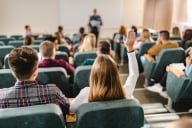You have /5 articles left.
Sign up for a free account or log in.

Outdoor pre-orientation adventure programs can support students’ feelings of belonging and improve their retention at the college.
molchandovdmitry/iStock/Getty Images
Getting college students to unplug and get into nature can be a challenge, but pre-orientation wilderness adventure programs tap into student’s desire to explore—and they encourage college readiness.
A centuries-old tradition in higher education, outdoor education is one way to unite students, encourage self-efficacy and promote healthy living, as well as increase retention and engagement on campus.
The research: A 2016 study of First Ascent at Appalachian State University found participants, compared to their peers who did a traditional orientation, were more likely to say the orientation helped them transition to the university and understand what they’re capable of. Participants also said the wilderness orientation program challenged them intellectually and encouraged them to get engaged in other community events and organizations.
Research from Clemson University, published in 2014, found students who participated in CU Outdoors were more confident building their social circle and more prepared to participate in recreation around campus.
Students choosing the outdoor orientation were more likely to retain and earned a higher GPA compared to their entire class, as well. The University of Montana tracks retention of Freshman Wilderness Experience participants and found it could be as much as 18.5 percent higher when compared to students who didn’t participate. Similarly, West Virginia University researchers identified, regardless of residency status or gender, outdoor orientation program participants were more likely to return to the university and graduate within six years.
Elements of success: Some of the factors that make wilderness pre-orientation activities unique are:
- A sense of adventure. Students aren’t just getting outside in these programs; they’re hiking miles a day, canoeing across rivers, climbing mountains and more. Many orientation programs are designed to accommodate students of different skill levels, serving students who already have a passion for the activities or are just dipping their toes in. The University of Redlands has three tracks for students to choose from, allowing them to select their comfort level.
Accessibility in the Spotlight
As higher education becomes increasingly diverse, understanding and accommodating the needs of different students is important to their success. Students with disabilities or other accessibility challenges, such as dietary restrictions or allergies, may not be able to participate in all elements of an outdoor adventure.
- Interpersonal skill development. Getting off the grid can require students to learn new technical skills, such as pitching a tent, starting a fire or paddling a kayak. But it also teaches students confidence, teamwork, resilience and more. A 2018 student blogger from Johns Hopkins University said she learned from her pre-orientation program to face obstacles head on, go with the flow, work to achieve goals and make friends. Many orientation programs include a discussion or reflection time, helping connect experiences to life skills.
- Community. The 2016 study found a majority of students participated in Appalachian State’s First Ascent because they wanted to meet new people or had a love of the outdoors, showing how students see adventure-focused orientations programs as an avenue to meet like-minded peers. The University of the South hosts Finding Your Place, a nine-day faculty-led experience that transitions into a regular seminar or field class, helping solidify relationships between students and faculty members as well as the cohort of learners.
- University tradition. At some institutions, like Harvard University and Williams College, outdoor adventures are the oldest pre-orientation program offered, so participants can feel a strong sense of connection to the university’s history. At Gordon College, students are required to participate in some type of outdoor education program, making it a universal experience.
- Student leadership. Outdoor pre-orientation programs are frequently supported by upper-level students who lead the adventures, keep students safe and facilitate dialogues, providing an opportunity for them to develop as leaders and serve as mentors to incoming students. At Yale University, FOOT (first-year outdoor orientation trip) leaders are selected in their first or second year and serve for the duration of their college career.
Get more content like this directly to your inbox every weekday morning. Subscribe here.








